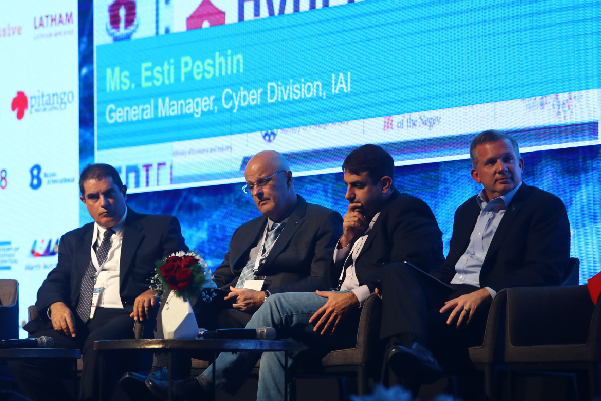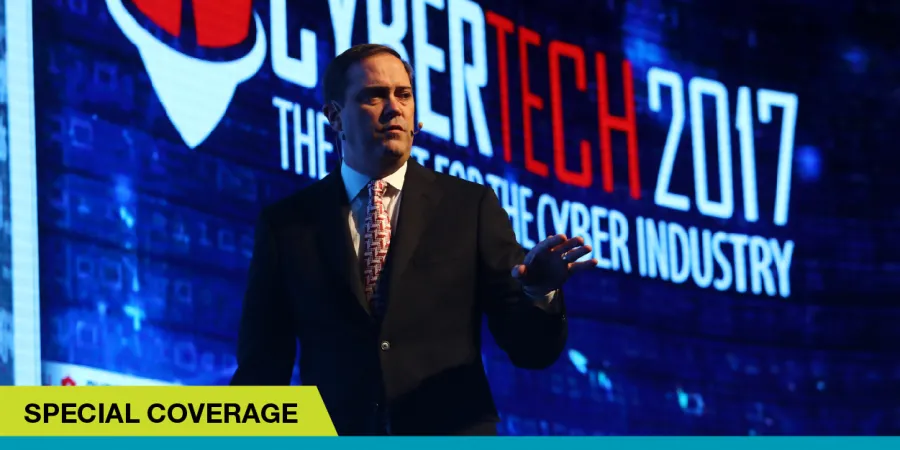Two Million Cyber Technology Specialists are currently in Demand
The panelists of the "National-Level CERT Centers" session at CyberTech 2017 discussed the need for establishing regional and international cooperative alliances in the face of growing cyber threats
Dan Arkin
| 01/02/2017
Chuck Robbins, Cisco's CEO: "There are more than 600 cybersecurity start-ups in Israel alone. They should be provided with a single infrastructure"
In his keynote address at CyberTech 2017, Cisco's CEO Chuck Robbins said, "Things are moving faster than anyone realizes. We are currently undergoing the most significant and fastest technological change we have ever experienced and will probably ever experience in our lifetime. The pace at which we move is very fast. To me, 2016 was a seminal year. Today, every city and company places the emphasis on technology at the heart of its activity. Sometime in the next decade we will have billions of appliances and a massive amount of information. There is a study that says that most of the links to the Internet will involve machines, and not just computers or tablets. We are producing this connection. The fundamental question is – are we secure? And more importantly, do the people understand the influence they have on this issue? Today, the greatest fear of every organization is that as the network presence increases, so do the threats. The attacks are becoming more sophisticated. We must think of these changes and on how we will have to defend ourselves more effectively. We should build a standard, uniform and usable defensive setup. There are more than 600 cybersecurity start-ups in Israel alone. They should be provided with a single infrastructure that would enable all of them to work efficiently and provide our clients, eventually, with the best possible security. The web is expanding. It will be impossible to delineate security around each and every organization. In our strategy, we decided to focus on the web. We believe we should be the first line of defense so we must strive for that uniform design."
National-Level CERT Centers
Most of the world's countries suffer from a serious shortage of manpower in the field of cyber technology – cyber technology, cybersecurity and cyber defense specialists. Worldwide, two million cyber technology specialists are currently in demand.
This was the essence of the "National-Level CERT Centers" session at the CyberTech 2017 Conference. The session moderator, Ms. Esti Peshin (General Manager of IAI's Cyber Division), opened by stating that in this world of cyber threats and dangers of various types, it will be impossible to cope with the phenomenon without cooperation between organizations and countries and without sharing information and knowledge internationally.

Alberto (Deto) Hasson, Head of the National CERT at the Israel National Cyber Security Authority, reported that the center started operating about a year ago and that today it already has about 200 male and female employees. The Israeli National CERT center focuses on the detection of cyberattacks. A CERT (Cyber Emergency Response Team) is on alert 24 hours a day in order to respond to calls from organizations and bodies that were attacked. This organ is a joint activity of several government ministries including the Prime Minister's Office, The Ministry of National Infrastructures, Energy & Water Resources and the Ministry of Finance. It maintains regular contacts with the civilian sector with regard to the relevant issues. It also maintains solid working relations with other defense/security organizations like IDF and the Israel Police.
Manoel da Fonseca from the Ministry of Industry, Foreign Trade and Services of Brazil reported that based on his experience, a new type of cyberattack is currently being encountered, among other things – against cloud computing centers and industrial sectors. According to him, the only way to cope with the modern cyber threats is through in-depth studying, using the most advanced technologies and establishing regional and international cooperative alliances. The governments and the civilian sector must be a part of these processes in order to identify threats, study them in depth and develop methods for coping with the threats.
The IoT Challenge
A special session was devoted to the Internet of Things. The speakers defined the Internet of Things as all of the instruments and appliances in industry, in the private home (like the aforementioned smart fridge), in health systems, in vehicles and transportation and in smart cities that are connected to the Internet. Every Internet server in the private home is a target for hacking attempts by cyber attackers. This threat is extended by such cyber attack activities as financial fraud (cyber attacks against banks and financial institutions) and DDoS attacks – attacks intended to deny service. The speakers at this session agreed that the IoT world is a weak link in the field of cybersecurity. Consequently, some companies have developed multiple-tier protective layouts for IoT instruments and appliances that incorporate different defensive technologies, various firewalls and more advanced protective methods. The speakers recommended various ways to protect instruments and appliances, but the manufacturers must consider the development and manufacture of home appliances and other devices that would include original measures for preventing cyber attacks and hacking.
The participants of the IoT session were Professor Yuval Elovitch from the Ben-Gurion University, Nir Peleg from the National Cyber Bureau, Daniel Bren – formerly of the IDF C4I Directorate, and Joshua Goldfarb from the FireEye Company.
Cybersecurity Entrepreneurs in 2017
Charles Blauner, Global Head of Information Security at Citi, who participated in the panel “WHAT WILL 2017 LOOK LIKE FOR CYBERSECURITY ENTREPRENEURS?" said, “Security is critically important for Citi, and we are constantly on the lookout for real innovation. We have established our global Security Innovation Center In Tel Aviv, in order to leverage the unique cyber innovation eco-system in Israel and its exceptional talent pool – we are performing extensive development & innovation activity and collaborating with leading startups, security vendors and thought leaders to create disruptive security solutions for the financial industry and keep Citi at the Cyber technology forefront.”
The panelists of the "National-Level CERT Centers" session at CyberTech 2017 discussed the need for establishing regional and international cooperative alliances in the face of growing cyber threats
Chuck Robbins, Cisco's CEO: "There are more than 600 cybersecurity start-ups in Israel alone. They should be provided with a single infrastructure"
In his keynote address at CyberTech 2017, Cisco's CEO Chuck Robbins said, "Things are moving faster than anyone realizes. We are currently undergoing the most significant and fastest technological change we have ever experienced and will probably ever experience in our lifetime. The pace at which we move is very fast. To me, 2016 was a seminal year. Today, every city and company places the emphasis on technology at the heart of its activity. Sometime in the next decade we will have billions of appliances and a massive amount of information. There is a study that says that most of the links to the Internet will involve machines, and not just computers or tablets. We are producing this connection. The fundamental question is – are we secure? And more importantly, do the people understand the influence they have on this issue? Today, the greatest fear of every organization is that as the network presence increases, so do the threats. The attacks are becoming more sophisticated. We must think of these changes and on how we will have to defend ourselves more effectively. We should build a standard, uniform and usable defensive setup. There are more than 600 cybersecurity start-ups in Israel alone. They should be provided with a single infrastructure that would enable all of them to work efficiently and provide our clients, eventually, with the best possible security. The web is expanding. It will be impossible to delineate security around each and every organization. In our strategy, we decided to focus on the web. We believe we should be the first line of defense so we must strive for that uniform design."
National-Level CERT Centers
Most of the world's countries suffer from a serious shortage of manpower in the field of cyber technology – cyber technology, cybersecurity and cyber defense specialists. Worldwide, two million cyber technology specialists are currently in demand.
This was the essence of the "National-Level CERT Centers" session at the CyberTech 2017 Conference. The session moderator, Ms. Esti Peshin (General Manager of IAI's Cyber Division), opened by stating that in this world of cyber threats and dangers of various types, it will be impossible to cope with the phenomenon without cooperation between organizations and countries and without sharing information and knowledge internationally.

Alberto (Deto) Hasson, Head of the National CERT at the Israel National Cyber Security Authority, reported that the center started operating about a year ago and that today it already has about 200 male and female employees. The Israeli National CERT center focuses on the detection of cyberattacks. A CERT (Cyber Emergency Response Team) is on alert 24 hours a day in order to respond to calls from organizations and bodies that were attacked. This organ is a joint activity of several government ministries including the Prime Minister's Office, The Ministry of National Infrastructures, Energy & Water Resources and the Ministry of Finance. It maintains regular contacts with the civilian sector with regard to the relevant issues. It also maintains solid working relations with other defense/security organizations like IDF and the Israel Police.
Manoel da Fonseca from the Ministry of Industry, Foreign Trade and Services of Brazil reported that based on his experience, a new type of cyberattack is currently being encountered, among other things – against cloud computing centers and industrial sectors. According to him, the only way to cope with the modern cyber threats is through in-depth studying, using the most advanced technologies and establishing regional and international cooperative alliances. The governments and the civilian sector must be a part of these processes in order to identify threats, study them in depth and develop methods for coping with the threats.
The IoT Challenge
A special session was devoted to the Internet of Things. The speakers defined the Internet of Things as all of the instruments and appliances in industry, in the private home (like the aforementioned smart fridge), in health systems, in vehicles and transportation and in smart cities that are connected to the Internet. Every Internet server in the private home is a target for hacking attempts by cyber attackers. This threat is extended by such cyber attack activities as financial fraud (cyber attacks against banks and financial institutions) and DDoS attacks – attacks intended to deny service. The speakers at this session agreed that the IoT world is a weak link in the field of cybersecurity. Consequently, some companies have developed multiple-tier protective layouts for IoT instruments and appliances that incorporate different defensive technologies, various firewalls and more advanced protective methods. The speakers recommended various ways to protect instruments and appliances, but the manufacturers must consider the development and manufacture of home appliances and other devices that would include original measures for preventing cyber attacks and hacking.
The participants of the IoT session were Professor Yuval Elovitch from the Ben-Gurion University, Nir Peleg from the National Cyber Bureau, Daniel Bren – formerly of the IDF C4I Directorate, and Joshua Goldfarb from the FireEye Company.
Cybersecurity Entrepreneurs in 2017
Charles Blauner, Global Head of Information Security at Citi, who participated in the panel “WHAT WILL 2017 LOOK LIKE FOR CYBERSECURITY ENTREPRENEURS?" said, “Security is critically important for Citi, and we are constantly on the lookout for real innovation. We have established our global Security Innovation Center In Tel Aviv, in order to leverage the unique cyber innovation eco-system in Israel and its exceptional talent pool – we are performing extensive development & innovation activity and collaborating with leading startups, security vendors and thought leaders to create disruptive security solutions for the financial industry and keep Citi at the Cyber technology forefront.”



